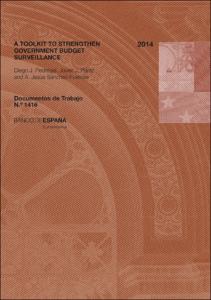A toolkit to strengthen government budget surveillance
Authors
Issue Date
11-Jul-2014
Physical description
40 p. : tab., gráf.
Abstract
En este trabajo presentamos una herramienta para el seguimiento en tiempo real de la ejecución presupuestaria de las Administraciones Públicas en España. La herramienta incorpora un conjunto amplio de modelos estadísticos, con diferentes niveles de agregación entre partidas presupuestarias y subsectores de las Administraciones Públicas, que permiten procesar de manera efi ciente la sustancial información mensual y trimestral publicada actualmente por las autoridades estadísticas en España. La principal utilidad de la herramienta es complementar el análisis habitualmente realizado para detectar de manera anticipada posibles riesgos de desviación con respecto a los objetivos fi scales ofi ciales
In this paper we develop a comprehensive short-term fiscal forecasting system of use for the real-time monitoring of the Spanish government’s borrowing requirement. Spain has been at the centre of the recent European sovereign debt crisis, not least because of sizeable failures in meeting public defi cit targets. The system comprises a suite of models, with different levels of disaggregation (bottom-up vs top-down
general government vs sub-sectors), which are suitable for the automatic processing of the large amount of monthly/quarterly fi scal data currently published by the Spanish statistical authorities. Our tools are instrumental in the ex-ante detection of risks to offi cial projections, and can thus help reduce the ex-post reputational costs of budgetary slippage. On the basis of our results, we discuss how offi cial monitoring bodies could expand, on one hand, their toolkit to evaluate regular adherence to targets (moving beyond a legalistic approach) and, on the other, their communication policies as regards sources of risks to (ex-ante) compliance with budgetary targets
In this paper we develop a comprehensive short-term fiscal forecasting system of use for the real-time monitoring of the Spanish government’s borrowing requirement. Spain has been at the centre of the recent European sovereign debt crisis, not least because of sizeable failures in meeting public defi cit targets. The system comprises a suite of models, with different levels of disaggregation (bottom-up vs top-down
general government vs sub-sectors), which are suitable for the automatic processing of the large amount of monthly/quarterly fi scal data currently published by the Spanish statistical authorities. Our tools are instrumental in the ex-ante detection of risks to offi cial projections, and can thus help reduce the ex-post reputational costs of budgetary slippage. On the basis of our results, we discuss how offi cial monitoring bodies could expand, on one hand, their toolkit to evaluate regular adherence to targets (moving beyond a legalistic approach) and, on the other, their communication policies as regards sources of risks to (ex-ante) compliance with budgetary targets
Publish on
Documentos de Trabajo / Banco de España, 1416
Subjects
Government accountability; Transparency; Fiscal forecasting; Transparencia de las Administraciones Públicas; Mecanismos de control presupuestario; Previsiones presupuestarias; Déficit y deuda públicos; Política fiscal; Modelos econométricos; España
Appears in Collections:












